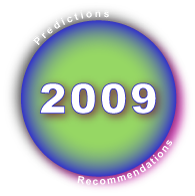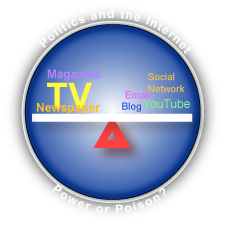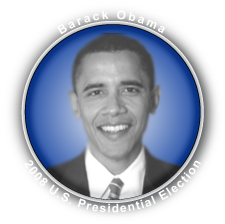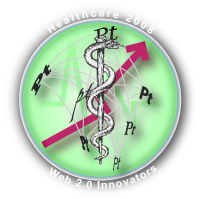In the knowledge economy, people are motivated by greater autonomy, mastery, and purpose—not by carrots or sticks.. connectivity is second only to a water pump in its significance to a village.. It will not be enough, as it was back in the early Web, to just leave a website lying around to be found. Business has to become a travelling exhibit, a movable market stall that can be adjusted and placed wherever people are or want to be.. Marketers have begun to view social networks as a significant marketing contact point (and perhaps even more important than traditional channels) for procuring consumer data and knowledge.. people are diving into the Web 2.0 and 3.0 pools before they even know with whom they are swimming.. In 2010 we will see more public agencies taking risks to engage in this sort of “flat” information sharing and insight gathering.. sociology will rapidly become the new economics. […]
Review and Analysis of the twenty-first century’s first decade, how Web 1.0 and Web 2.0 are disrupting executives, enterprises, society and government.. crowdsourcing, collaboration, innovation, privacy, globalization, terrorism, organizational unbundling, and how to thrive in the Knowledge Economy’s accelerating volatility, which will spell the end of many Industrial Economy enterprises. […]
Digital social networks are transforming every field of human endeavor because they change the economics of how people discover, develop and maintain relationships. Therefore, social networks propose a revolution in communication is similar in scope to Ford’s invention of the assembly line for fabrication but executives don’t understand it. This post […]
Volatility, Uncertainly and Opportunity—Move Crisply while Competitors Are in Disarray
 Now that the Year in Review 2008 has summarized key trends, we are in excellent position for 2009 prognostications, so welcome to Part II. As all experienced executives know, risk and reward are inseparable twins, and periods of disruption elevate both, so you will have much more opportunity to produce uncommon value than normal. Now that the Year in Review 2008 has summarized key trends, we are in excellent position for 2009 prognostications, so welcome to Part II. As all experienced executives know, risk and reward are inseparable twins, and periods of disruption elevate both, so you will have much more opportunity to produce uncommon value than normal.
This is a high-stakes year in which we can expect surprises. Web 2.0 and social networks can help because they increase flexibility and adaptiveness. Alas, those who succeed will have to challenge conventional thinking considerably, which is not a trivial exercise in normal times. The volatility that many businesses face will make it more difficult because many of their clients and/or employees will be distracted. It will also make it easier because some of them will perceive that extensive change is afoot, and Web 2.0 will blend in with the cacaphony. Disruption produces unusual changes in markets, and the people that perceive the new patterns and react appropriately emerge as new leaders.
[…]
Editor’s Choice of the Global Human Capital Journal—Accelerating Disruption and Opportunity
 What a year! When I wrote in the 2007 Year in Review that 2008 “would produce an unimaginable degree of change,” I had no idea how right that would prove to be. We saw major disruption in the global economy, and the U.S. presidential campaign closed the year with a major political upset, largely at the hand of social media. That said, I still believe that 2008 will prove to be a transitional year and that more profound change is on the way. What a year! When I wrote in the 2007 Year in Review that 2008 “would produce an unimaginable degree of change,” I had no idea how right that would prove to be. We saw major disruption in the global economy, and the U.S. presidential campaign closed the year with a major political upset, largely at the hand of social media. That said, I still believe that 2008 will prove to be a transitional year and that more profound change is on the way.
Look in any direction. From a macroeconomic perspective, the global economy is showing itself to be pervasively interdependent. The U.S. successfully exported its real estate finance crisis without even working up a sweat. I don’t believe that anyone really knows where all the bodies are buried yet, and central bank chairmen, national presidents and global organization leaders are still holding their breaths, even though they smile bravely on television. Barack Obama’s successful U.S. presidential campaign showed that a new era of politics is upon us; as we’ll discuss below, […]
Conventional Wisdom Scuttled—Disruption Preview—Business in the Batter’s Box
 Barack Obama’s presidential campaign was more than a major social media milestone because it ushered in a new relationship model among leaders and their supporters. Due to social media, an unprecedented number of individuals had a new kind of active, direct role in Obama’s campaign; moreover, I predict that the Obama campaign and imminent administration will change citizens’ and consumers’ expectations of “leader” and “follower” roles in government and business. Amazon.com changed consumers’ expectations about retail in general—information on demand, reviews, unbelievable variety at low prices—and a significant portion of Obama supporters will want to continue their support to “make the change happen.” These supporters will bring their changed expectations of action and collaboration to their vendors. That means your company. Barack Obama’s presidential campaign was more than a major social media milestone because it ushered in a new relationship model among leaders and their supporters. Due to social media, an unprecedented number of individuals had a new kind of active, direct role in Obama’s campaign; moreover, I predict that the Obama campaign and imminent administration will change citizens’ and consumers’ expectations of “leader” and “follower” roles in government and business. Amazon.com changed consumers’ expectations about retail in general—information on demand, reviews, unbelievable variety at low prices—and a significant portion of Obama supporters will want to continue their support to “make the change happen.” These supporters will bring their changed expectations of action and collaboration to their vendors. That means your company.
The Obama campaign is very instructive to business leaders because business customers are changing expectations of their leaders, as we’ll discuss in more detail below. As the Global Human Capital Journal is not primarily focused on politics, I am less interested in the fact that Obama was elected than how he was elected. Moreover, […]
Cites International Mindset, Judgment and Flexibility—Ambiguity and Global Transformation Form the Backdrop
 The 2008 U.S. presidential election has been the most dramatic in recent history by any measure. Converging economic, cultural and political issues are increasing the level of discomfort among voters and raising the stakes. In endorsing Barack Obama, I have considered the candidates in several dimensions, but my primary perspective has been that of a management consultant. The United States is a client in crisis, and I have asked myself, “What kind of leader does the country need, given the challenges it faces?” Barack Obama is my prescription, although there may be unwelcome side effects. If circumstances were different, I might well have favored John McCain. The 2008 U.S. presidential election has been the most dramatic in recent history by any measure. Converging economic, cultural and political issues are increasing the level of discomfort among voters and raising the stakes. In endorsing Barack Obama, I have considered the candidates in several dimensions, but my primary perspective has been that of a management consultant. The United States is a client in crisis, and I have asked myself, “What kind of leader does the country need, given the challenges it faces?” Barack Obama is my prescription, although there may be unwelcome side effects. If circumstances were different, I might well have favored John McCain.
[…]
How Consumer-Generated Content Is Contributing to Transparency in Healthcare
 Healthcare systems worldwide are criticized for falling short of expectations, and countries like the U.S. which feature aging populations, are rapidly approaching a crisis. Demand and cost will grow, but the system as currently structured will certainly break down unless radical changes are made. Web 2.0’s disruptive potential can be part of the remedy: we need to introduce much more accountability and collaboration into all parts of the system. We need to change the paternalistic attitudes that pervade the system, treat patients as active participants and encourage everyone to be more accountable. This series introduces healthcare Web 2.0 innovators. Healthcare systems worldwide are criticized for falling short of expectations, and countries like the U.S. which feature aging populations, are rapidly approaching a crisis. Demand and cost will grow, but the system as currently structured will certainly break down unless radical changes are made. Web 2.0’s disruptive potential can be part of the remedy: we need to introduce much more accountability and collaboration into all parts of the system. We need to change the paternalistic attitudes that pervade the system, treat patients as active participants and encourage everyone to be more accountable. This series introduces healthcare Web 2.0 innovators.
Business Drivers
Consumer-directed healthcare is an attempt to decrease U.S. healthcare costs by giving healthcare consumers (patients) a financial stake in the healthcare they access. At the consumer level, most programs consist of two parts, a high deductible health policy to protect against catastrophic expenses and a health savings account (HSA), which consumers use to pay the majority of their healthcare expenses. HSAs are tax-advantaged: in most cases, the consumer pays for healthcare […]
How a “Facebook for Health Conditions” Is Redefining Privacy and Collaboration
 Healthcare systems worldwide are criticized for falling short of expectations, and countries like the U.S., which feature aging populations, are rapidly approaching a crisis. Demand and cost will grow, but the system as currently structured will certainly break down unless radical changes are made. Web 2.0’s disruptive potential can be part of the remedy: we need to introduce much more accountability and collaboration into all parts of the system. We need to change the paternalistic attitudes that pervade the system, treat patients as active participants and encourage everyone to be more accountable. This series introduces healthcare Web 2.0 innovators. Healthcare systems worldwide are criticized for falling short of expectations, and countries like the U.S., which feature aging populations, are rapidly approaching a crisis. Demand and cost will grow, but the system as currently structured will certainly break down unless radical changes are made. Web 2.0’s disruptive potential can be part of the remedy: we need to introduce much more accountability and collaboration into all parts of the system. We need to change the paternalistic attitudes that pervade the system, treat patients as active participants and encourage everyone to be more accountable. This series introduces healthcare Web 2.0 innovators.
Business Drivers
PatientsLikeMe is a digital social network where patients of chronic, life-changing diseases share detailed quantifiable information about themselves, their diseases and their treatments’ effectiveness. The goal of the site is to improve quality of life by sharing information.
[…]
New Life Sciences Accelerator Leverages Digital Social Network, Inspired by LinkedIn and Facebook
 Healthcare systems worldwide are criticized for falling short of expectations, and countries like the U.S. which feature aging populations, are rapidly approaching a crisis. Demand and cost will grow, but the system as currently structured will certainly break down unless radical changes are made. Web 2.0’s disruptive potential can be part of the remedy: we need to introduce much more accountability and collaboration into all parts of the system. We need to change the paternalistic attitudes that pervade the system, treat patients as active participants and encourage everyone to be more accountable. This series introduces healthcare Web 2.0 innovators. Healthcare systems worldwide are criticized for falling short of expectations, and countries like the U.S. which feature aging populations, are rapidly approaching a crisis. Demand and cost will grow, but the system as currently structured will certainly break down unless radical changes are made. Web 2.0’s disruptive potential can be part of the remedy: we need to introduce much more accountability and collaboration into all parts of the system. We need to change the paternalistic attitudes that pervade the system, treat patients as active participants and encourage everyone to be more accountable. This series introduces healthcare Web 2.0 innovators.
[…]
|
|

 Now that the Year in Review 2008 has summarized key trends, we are in excellent position for 2009 prognostications, so welcome to Part II. As all experienced executives know, risk and reward are inseparable twins, and periods of disruption elevate both, so you will have much more opportunity to produce uncommon value than normal.
Now that the Year in Review 2008 has summarized key trends, we are in excellent position for 2009 prognostications, so welcome to Part II. As all experienced executives know, risk and reward are inseparable twins, and periods of disruption elevate both, so you will have much more opportunity to produce uncommon value than normal. What a year! When I wrote in the 2007 Year in Review that 2008 “would produce an unimaginable degree of change,” I had no idea how right that would prove to be. We saw major disruption in the global economy, and the U.S. presidential campaign closed the year with a major political upset, largely at the hand of social media. That said, I still believe that 2008 will prove to be a transitional year and that more profound change is on the way.
What a year! When I wrote in the 2007 Year in Review that 2008 “would produce an unimaginable degree of change,” I had no idea how right that would prove to be. We saw major disruption in the global economy, and the U.S. presidential campaign closed the year with a major political upset, largely at the hand of social media. That said, I still believe that 2008 will prove to be a transitional year and that more profound change is on the way. Barack Obama’s presidential campaign was more than a major social media milestone because it ushered in a new relationship model among leaders and their supporters. Due to social media, an unprecedented number of individuals had a new kind of active, direct role in Obama’s campaign; moreover, I predict that the Obama campaign and imminent administration will change citizens’ and consumers’ expectations of “leader” and “follower” roles in government and business. Amazon.com changed consumers’ expectations about retail in general—information on demand, reviews, unbelievable variety at low prices—and a significant portion of Obama supporters will want to continue their support to “make the change happen.” These supporters will bring their changed expectations of action and collaboration to their vendors. That means your company.
Barack Obama’s presidential campaign was more than a major social media milestone because it ushered in a new relationship model among leaders and their supporters. Due to social media, an unprecedented number of individuals had a new kind of active, direct role in Obama’s campaign; moreover, I predict that the Obama campaign and imminent administration will change citizens’ and consumers’ expectations of “leader” and “follower” roles in government and business. Amazon.com changed consumers’ expectations about retail in general—information on demand, reviews, unbelievable variety at low prices—and a significant portion of Obama supporters will want to continue their support to “make the change happen.” These supporters will bring their changed expectations of action and collaboration to their vendors. That means your company. The 2008 U.S. presidential election has been the most dramatic in recent history by any measure. Converging economic, cultural and political issues are increasing the level of discomfort among voters and raising the stakes. In endorsing Barack Obama, I have considered the candidates in several dimensions, but my primary perspective has been that of a management consultant. The United States is a client in crisis, and I have asked myself, “What kind of leader does the country need, given the challenges it faces?” Barack Obama is my prescription, although there may be unwelcome side effects. If circumstances were different, I might well have favored John McCain.
The 2008 U.S. presidential election has been the most dramatic in recent history by any measure. Converging economic, cultural and political issues are increasing the level of discomfort among voters and raising the stakes. In endorsing Barack Obama, I have considered the candidates in several dimensions, but my primary perspective has been that of a management consultant. The United States is a client in crisis, and I have asked myself, “What kind of leader does the country need, given the challenges it faces?” Barack Obama is my prescription, although there may be unwelcome side effects. If circumstances were different, I might well have favored John McCain. Healthcare systems worldwide are criticized for falling short of expectations, and countries like the U.S. which feature aging populations, are rapidly approaching a crisis. Demand and cost will grow, but the system as currently structured will certainly break down unless radical changes are made. Web 2.0’s disruptive potential can be part of the remedy: we need to introduce much more accountability and collaboration into all parts of the system. We need to change the paternalistic attitudes that pervade the system, treat patients as active participants and encourage everyone to be more accountable. This series introduces healthcare Web 2.0 innovators.
Healthcare systems worldwide are criticized for falling short of expectations, and countries like the U.S. which feature aging populations, are rapidly approaching a crisis. Demand and cost will grow, but the system as currently structured will certainly break down unless radical changes are made. Web 2.0’s disruptive potential can be part of the remedy: we need to introduce much more accountability and collaboration into all parts of the system. We need to change the paternalistic attitudes that pervade the system, treat patients as active participants and encourage everyone to be more accountable. This series introduces healthcare Web 2.0 innovators. Healthcare systems worldwide are criticized for falling short of expectations, and countries like the U.S. which feature aging populations, are rapidly approaching a crisis. Demand and cost will grow, but the system as currently structured will certainly break down unless radical changes are made. Web 2.0’s disruptive potential can be part of the remedy: we need to introduce much more accountability and collaboration into all parts of the system. We need to change the paternalistic attitudes that pervade the system, treat patients as active participants and encourage everyone to be more accountable. This series introduces healthcare Web 2.0 innovators.
Healthcare systems worldwide are criticized for falling short of expectations, and countries like the U.S. which feature aging populations, are rapidly approaching a crisis. Demand and cost will grow, but the system as currently structured will certainly break down unless radical changes are made. Web 2.0’s disruptive potential can be part of the remedy: we need to introduce much more accountability and collaboration into all parts of the system. We need to change the paternalistic attitudes that pervade the system, treat patients as active participants and encourage everyone to be more accountable. This series introduces healthcare Web 2.0 innovators.